
- AI is fundamentally reshaping industries, challenging traditional business practices, and driving innovation.
- Shopify’s new hiring policy emphasizes AI’s potential, requiring proof that AI cannot perform a job before human hires are made.
- Procore’s focus on AI in construction indicates a shift towards more efficient, automation-driven workflows with an emphasis on upskilling the workforce.
- Bank of America integrates AI extensively to enhance productivity and improve customer service, transforming both operations and client interactions.
- The retail sector anticipates significant changes due to AI, with a focus on enhancing customer experiences and utilizing generative AI in advertising.
- AI is becoming a core component of business strategy, offering democratized competitive advantages applicable to businesses of all sizes.
- The AI revolution is an ongoing development impacting organizational structures and operations across various sectors.
The relentless march of artificial intelligence is reshaping industries and challenging traditional ways of doing business, with several key players leading the charge this week. Shopify’s CEO, Tobi Lütke, has made waves by setting a radical new hiring policy: prove that AI cannot handle the job before bringing in humans. This approach is emblematic of Shopify’s drive to integrate AI more deeply into its operations. With tools like Shopify Magic and Sidekick, the company isn’t just improving productivity but fundamentally altering the human-algorithm dynamic in its workforce. However, such policies also come with a downside – the specter of layoffs looms, hinting at the broader implications of AI integration for jobs.
As companies like Shopify navigate the AI landscape, others such as Procore are focusing on how these technological shifts alter entire industries. Procore’s “Future State of Construction” report delves into the transformative effects AI and automation are having on construction. With inefficiencies on the decline and a sizable portion of the workforce set to retire by 2036, the industry is poised for rapid evolution. Automation and upskilling programs are already becoming central strategies to maintain a competitive edge and attract new talent.
AI’s influence doesn’t stop at tech-centric companies. Over at Bank of America, the AI adaptation is comprehensive, with over 90% of its vast workforce utilizing AI tools. AI not only enhances productivity but also refines customer service, utilizing interactive simulations to boost employee-client interactions. This commitment to AI demonstrates a transformation not only in operations but in the customer experience itself.
Meanwhile, retail leaders at Shoptalk’s Spring 2025 conference have painted a picture of an industry on the cusp of change. Discussions around AI focused on enhancing customer experiences, innovative storytelling in retail, and the creative power of tools like Meta’s generative AI for advertising. These leaders underscore a critical truth: the future belongs to organizations that embrace human-AI collaboration.
As AI continues to mature, what we’re observing is more than a technological trend; it’s a profound shift in how businesses are structured and how they operate. This week, the message is clear: AI isn’t just an auxiliary tool—it’s becoming the backbone of modern business strategy. For small and mid-sized businesses, there’s a vital takeaway: as these technologies develop, they’re set to democratize, offering competitive advantages once thought exclusive to giants like Shopify and Bank of America. The key for all businesses now is to recognize these shifts and adjust strategies accordingly—because the AI revolution is not just coming; it’s already here.
AI Revolution: How Businesses Can Thrive in a New Era of Intelligence
Key Insights on AI Integration in Business
Artificial Intelligence (AI) is reshaping industries across the globe, pushing boundaries and redefining the competitive landscape. At the forefront, companies like Shopify, Procore, and Bank of America are leveraging AI to streamline operations, improve customer experiences, and gain strategic advantages. As AI technologies mature, the implications for the job market, productivity, and industry dynamics become increasingly profound.
1. Shopify’s Bold AI-First Employment Strategy
AI-Driven Hiring Policies:
Shopify CEO Tobi Lütke’s innovative hiring policy emphasizes AI’s growing role in the workforce. By requiring proof that AI cannot handle a role before hiring humans, Shopify illustrates how AI can redefine the workforce structure. This strategy helps in identifying areas where AI can enhance productivity and potentially reduce costs.
Tools for Transformation:
– Shopify Magic & Sidekick: These AI tools help automate routine tasks and offer advanced insights and analytics, enhancing decision-making and operational efficiency.
– Impact on Employment: While reducing the need for human-led roles, such AI integration could threaten job security. Upskilling the workforce becomes crucial to counterbalance this effect.
2. AI’s Influence on Construction via Procore
Industry Impact Report:
Procore’s “Future State of Construction” report outlines AI’s impact on construction, highlighting decreased inefficiencies and a shift towards automation and upskilling.
Strategic Adaptations:
– Automation: Reduces manual error and accelerates project timelines. As a significant portion of the construction workforce nears retirement, automation becomes indispensable.
– Upskilling: Programs designed to train existing workers in AI and automation technologies ensure a competent and future-ready workforce.
3. Bank of America Leading AI-Driven Customer Experience
Comprehensive AI Utilization:
With over 90% of its workforce using AI tools, Bank of America is a testament to AI’s transformative power in financial services. AI enhances productivity and elevates customer satisfaction through:
– Interactive Simulations: Provide personalized, efficient customer service.
– Automated Insights: Drive data-driven decision-making, improving financial advisement quality.
4. Retail’s Evolving Landscape: Insights from Shoptalk 2025
AI-Powered Customer Engagement:
The retail sector, as discussed at Shoptalk 2025, is poised for a revolution through AI-enhanced storytelling and advertising. Retailers are utilizing AI to:
– Boost Customer Experiences: AI-driven analytics and personalization deliver more engaging and effective shopping experiences.
– Innovative Advertising: Tools like Meta’s generative AI allow for more creative and targeted marketing campaigns.
Addressing Concerns and Strategic Recommendations
Controversies & Limitations:
– Job Displacement: The shift towards AI risks displacing jobs. Proactive measures such as continuous reskilling and upskilling are essential.
– Security & Privacy: AI deployment raises concerns about data security and customer privacy. Companies need robust policies to address these issues.
Market Forecasts & Industry Trends:
– AI Democratization: As AI becomes more accessible, small and mid-sized businesses can benefit from technologies once limited to large corporations.
– AI in SMBs: Embrace AI to gain competitive advantages and streamline operations.
Pros & Cons Overview:
– Pros: Increased productivity, improved customer experiences, operational efficiencies.
– Cons: Potential job losses, data security risks, initial implementation costs.
Actionable Recommendations:
– Embrace AI Integration: Evaluate areas where AI can be integrated to improve efficiency and customer engagement.
– Focus on Workforce Development: Implement upskilling programs to prepare employees for AI-augmented roles.
– Enhance Security Protocols: Develop robust data protection measures to safeguard privacy.
Adapting to these changes is vital for businesses aiming to thrive in the AI-driven future. Understanding and embracing AI can unlock new potentials and drive sustainable growth.
Related Links:
– Shopify
– Procore
– Bank of America



